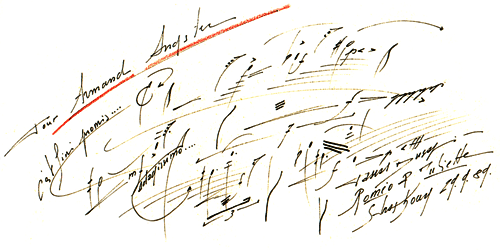Programs

DOWNLOAD
> Article DNA : création “Voix interdites”PROGRAMS
Monographic concerts
Accroche Note proposes a variety of monographic programmes; the list below is not however exhaustive but merely illustrates the amplitude of the ensembles repertoire.
The ensemble has produced the following monographic programmes:
Georges Aperghis – James Dillon – Franco Donatoni – Pascal Dusapin – Ivan Fedele – Michael Jarrell – Helmut Lachenmann – Hans-Ulrich Lehmann – François-Bernard Mâche – Philippe Manoury – Marc Monnet – Luis de Pablo – Gérard Pesson – Iannis Xenakis
Voix interdites by Ahmed Essyad (2005)
For soprano and seven instruments, 60mins
Forbidden Voices, the new song cycle by Ahmed Essyad, expresses simultaneously that which is kept secret, that which cannot be said, and that which is forgotten but later awakened by consciousness. This work of variable instrumental formation is inspired by Sufism, the mystical dimension of Islam, drawing notably upon texts by Al-Hallaj (857-922). As in many of the composers works, the voice, used in the context of a given language, serves as the basis for the musical gesture.
L'office des Naufragés by Olivier Greif (1998)
Olivier Grief’s, both Polish Jews who had survived the Holocaust, were natives of the region of Galizia during a time when its borders were constantly changing. His music is greatly influenced by this heritage.
Inspired by multiple literary sources, L’Office des Naufragés is a song of overwhelming intensity. In the omnipresent shadow of death, the voice of serenity is like a light of hope.
Portraits Croisés (Crossed portraits) : Classical/Contemporary
ou concerts croisés : musique classique/musique contemporaine
The idea here is to satisfy the curiosity of the public, who sometimes question the meaning and reason of musical trends, and mix works by artists who have become friends and with those of the composers who inspired them. This series of concerts allows Accroche Note to create programmes which are not usually possible due to the fact that contemporary music is usually not ‘mixed‘ with other genres. These “crossed portraits” create a link between today’s music and that of the past.
Based around two more composers:
Messiean Quatuor pour la fin du temps et Mâche Trois chants sacrés, Ferrari, Schubert, Brahms, Johnson, Bach, Dusapin etc…
Folk music
With the works of Berio (Folk Songs), Britten, Stravinsky, Schumann, Canteloube, Villa Lobos, De Falla for soprano and 7 instruments






